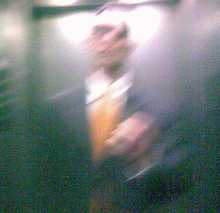Here is the scenario - you get off your flight, go to baggage pickup, and wait for your luggage to appear in the carousel. And you wait. And you wait some more. Rather than risk missing your bags, you pretty much have to wait until the last bag appears. Then, realizing that your luggage "did not make it", you get in line at the Lost Luggage Office hoping that your bags are still in this galaxy.
Of course the airlines knew long before you landed that your bags "did not make it". They are probably already queued up for the next flight or in fact are already on the next flight. So why make you go through the charade of waiting at the carousel? A little more information in the service supply chain would surely go a long way towards making it more convenient for customers, and mitigating service failures.
This reminds me of a conversation I had with a IT guy at a big European airline. He was complaining that his server received so many hits from people who ended up not buying a ticket that he had to upgrade the hardware from time to time. Kind of like Macy's complaining about too much foot traffic.
The airlines have not figured out yet that they are information processing companies with airplanes. Until they do, the airport forecast for today, tomorrow and the indefinite future is for delays.
Friday, December 28, 2007
Wednesday, December 12, 2007
Difficult Interfaces
Imagine having to, by necessity, deal with a sophisticated, difficult technology. Think of this technology as a sort of personal helper for one or more biological systems. Specifically, this device helps you with the timing of an important biological function - sleep. The technology is of course, the lowly clock radio.
My wife and I are in our hotel room, the night before we are due to return home. We have an early morning flight so we need to set the hotel alarm clock. This clock has custom stenciled instructions. You can see a photo of this "interface" in this blog entry below. Note the last line of said instructions: "Press ENTER".
 Huh? Where do you see ENTER? There is no enter key; the word ENTER does not appear anywhere on the front or back of the clock. How does a hotel employee or clock manufacturer manage to create instructions that require that the user press a non-existent key?
Huh? Where do you see ENTER? There is no enter key; the word ENTER does not appear anywhere on the front or back of the clock. How does a hotel employee or clock manufacturer manage to create instructions that require that the user press a non-existent key?
There is a fair amount of innovation going on in the economy as devices get smarter (Rijsdijk et al. 2007). More and more the economy is going to depend on the ability of people to explain tasks, procedures and interfaces to consumers. If this is any indication, we are all in trouble!
Further Reading
Norman, Donald A. (1994) The Design of Everyday Things, New York: Doubleday.
Rijsdijk, Serge A., Erik Jan Hultink, and Adamantios Diamantopoulos (2007), "Product Intelligence: Its Conceptualization, Measurement and Impact on Consumer Satisfaction," Journal of the Academy of Marketing Science, 35 (3), 340-356.
My wife and I are in our hotel room, the night before we are due to return home. We have an early morning flight so we need to set the hotel alarm clock. This clock has custom stenciled instructions. You can see a photo of this "interface" in this blog entry below. Note the last line of said instructions: "Press ENTER".
 Huh? Where do you see ENTER? There is no enter key; the word ENTER does not appear anywhere on the front or back of the clock. How does a hotel employee or clock manufacturer manage to create instructions that require that the user press a non-existent key?
Huh? Where do you see ENTER? There is no enter key; the word ENTER does not appear anywhere on the front or back of the clock. How does a hotel employee or clock manufacturer manage to create instructions that require that the user press a non-existent key?There is a fair amount of innovation going on in the economy as devices get smarter (Rijsdijk et al. 2007). More and more the economy is going to depend on the ability of people to explain tasks, procedures and interfaces to consumers. If this is any indication, we are all in trouble!
Further Reading
Norman, Donald A. (1994) The Design of Everyday Things, New York: Doubleday.
Rijsdijk, Serge A., Erik Jan Hultink, and Adamantios Diamantopoulos (2007), "Product Intelligence: Its Conceptualization, Measurement and Impact on Consumer Satisfaction," Journal of the Academy of Marketing Science, 35 (3), 340-356.
Saturday, December 1, 2007
Academia 2.0
Here are some Web 2.0 tools I wish we business academics had:
- A news story exchange - to help alert us to stories relevant to courses we are teaching. I often run into a great story that illustrates, say, advertising but unfortunately I am teaching marketing research that term. You are teaching advertising but spot a nice example of marketing research. How about a platform for sharing these things, and letting people add discussion questions and feedback from how the class reacted?
- A social network-capable version of EndNote. This would be a personalized citation library that would allow sharing and user tagging and also support comments and dialogs on papers. Maybe something like Facebook's "Wall" application but customized to let people link to other papers, and to allow different levels and types of moderation.
- A version control system for academic papers. These systems have been in use for software development for years supporting groups who write code together. Despite this, people who write papers together are basically stuck with Word's "Track Changes" function.
Subscribe to:
Posts (Atom)

